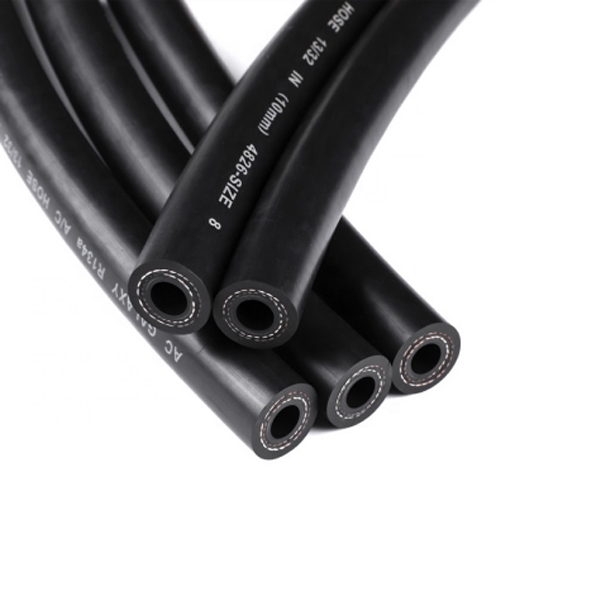high pressure fuel line hose
Dec . 12, 2024 12:31 Back to list
high pressure fuel line hose
High Pressure Fuel Line Hose An Essential Component for Engine Efficiency
In the realm of automotive engineering and fuel systems, the high-pressure fuel line hose stands out as a crucial component for ensuring engine performance and safety. These hoses are designed to withstand extreme pressure and temperature fluctuations, making them indispensable in modern fuel delivery systems. With the increasing complexity of engines and the requirement for higher efficiency, understanding the significance of high-pressure fuel line hoses becomes paramount.
What is a High-Pressure Fuel Line Hose?
High-pressure fuel line hoses are specialized tubes that transport fuel from the tank to the engine injectors. Unlike standard rubber hoses, these hoses are composed of different materials, such as reinforced rubber or thermoplastic, designed to endure the harsh conditions prevalent in an automotive environment. They are engineered to resist not only high pressure—often exceeding 1000 psi—but also the corrosive nature of various fuels, including gasoline and diesel.
Importance of High-Pressure Fuel Line Hoses
1. Safety One of the primary functions of high-pressure fuel line hoses is to enhance safety. Inadequate fuel line hoses can lead to leaks, which can cause fires or explosions. High-quality hoses are rigorously tested to ensure they can handle the high pressures without failing. This is critical in preventing fuel spills that could result in catastrophic accidents.
2. Engine Performance High-pressure hoses facilitate the efficient delivery of fuel to the engine. Any restriction or disruption in fuel flow can lead to performance issues such as knocking, reduced fuel economy, or even engine failure. The design of these hoses ensures a steady and reliable flow, which is essential for optimal combustion and engine power.
high pressure fuel line hose

3. Durability and Longevity A well-engineered high-pressure fuel line hose can significantly extend the life of an engine. These hoses are built to endure harsh operating conditions, including temperature fluctuations and exposure to harmful substances. Many modern hoses come with additional protective layers to combat abrasion and prevent external damage, further enhancing their longevity.
4. Compatibility with Modern Fuels As the automotive industry evolves, so does fuel composition. High-pressure fuel line hoses are designed to be compatible with a wide range of fuels, including ethanol-blended fuels and biodiesel. This adaptability is crucial as manufacturers continue to innovate and provide a transition to more sustainable fuel options.
Selection and Maintenance
When selecting high-pressure fuel line hoses, it is essential to consider several factors, such as the type of fuel, operating pressure, and the hose’s temperature rating. Additionally, regular inspection and maintenance of these hoses can prevent potential failures. Look for signs of wear, such as cracks or bulges, and replace hoses at recommended intervals or when any degradation is observed.
Conclusion
High-pressure fuel line hoses play a vital role in the automotive industry, ensuring safety, performance, and durability in fuel delivery systems. As engines become more advanced and fuel standards evolve, the need for high-quality, reliable hoses has never been greater. By choosing the right hoses and conducting regular maintenance, vehicle owners can ensure their engines operate efficiently and safely. Thus, understanding and appreciating the function of high-pressure fuel line hoses is imperative for anyone involved in automotive care and maintenance. Investing in quality hoses not only protects vehicles but also contributes to overall road safety and performance integrity.
Latest news
-
Air Conditioning Charging Hose: Durable AC Recharge Kits
NewsAug.22,2025
-
Premium 4890 AC Hose | Durable & Perfect Fit Replacement
NewsAug.21,2025
-
High-Quality AC Hose: Compressor to Evaporator for Car
NewsAug.19,2025
-
Glass Storage Jar with Acacia Vacuum Vented Cover - HEBEI KEMO|Thermal Resistance, Food-Grade Safety, Eco-Friendly
NewsAug.18,2025
-
Glass Storage Jar with Acacia Lid - Hebei Kemao | Heat-Resistant, Eco-Friendly
NewsAug.18,2025
-
Glass Storage Jar with Acacia Vacuum Vented Cover - HEBEI KEMO|Thermal Resistance,Eco-Friendly Storage
NewsAug.18,2025
